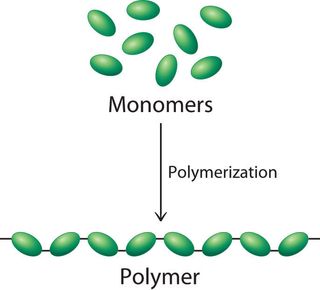Checking Out the Varied Applications and Advantages of Polymers in Different Industries
Polymers, with their diverse variety of buildings and functionalities, have become crucial in various sectors, each gaining one-of-a-kind gain from their application. Polymers. From boosting safety and security and efficiency in the vehicle market to reinventing medical devices in the healthcare industry, polymers play a crucial duty. Furthermore, their green nature is changing the landscape of sustainability methods. As we explore the depths of polymers in electronic devices, we discover cutting-edge technologies, while their architectural stability transforms the world of building and infrastructure. The prevalent impact of polymers across sectors is a testament to their versatility and flexibility, forming the future of countless fields.
Automotive Field Applications
Polymers play an essential role in improving the efficiency and sturdiness of numerous components within the vehicle sector. These flexible products are thoroughly utilized in the production of various parts, ranging from indoor elements to under-the-hood applications. One noticeable use polymers in the automobile sector remains in the production of lightweight elements. By changing traditional metal get rid of polymer-based choices, vehicles can achieve improved fuel effectiveness without endangering on toughness or safety and security.

Health Care Market Advantages
In different health care applications, the benefits of using polymers are commonly acknowledged for their varied series of helpful properties. Polymers play an essential role in the healthcare industry due to their versatility, biocompatibility, and cost-effectiveness. One of the primary benefits of polymers in medical care is their capacity to be customized to particular demands, such as flexibility, resilience, and biodegradability, making them optimal for a vast array of medical applications.
Polymer-based products are thoroughly utilized in medical tools, such as catheters, implants, prosthetics, and medication shipment systems, due to their biocompatibility and ability to resemble all-natural tissues. These products can minimize the danger of allergic responses or beings rejected, enhancing patient safety and security and results. Additionally, polymers are light-weight, making them appropriate for wearable medical tools and making sure client convenience.
Additionally, polymers make it possible for the development of cutting-edge treatment techniques, such as hydrogels for cells design and nanocomposites for targeted medicine delivery. Their simplicity of handling and sterilization makes them vital for keeping high criteria of hygiene in medical care setups. Generally, the varied advantages of polymers add significantly to improvements in clinical technology and individual treatment.
Environmental Benefits of Polymers

Furthermore, polymers can add to energy cost moved here savings because of their light-weight nature. In markets such as transport, light-weight polymer products can assist minimize gas intake and greenhouse gas exhausts. In addition, polymers can make it possible for the growth of energy-efficient items such as insulation products that boost power preservation in structures.
Furthermore, polymers play a critical duty in reducing water contamination. The usage of polymer-based purification systems can properly get rid of contaminants and contaminants from wastewater, securing water sources and ecosystems. In general, the environmental benefits of polymers make them beneficial properties in promoting sustainability and environment-friendly methods throughout different industries.
Polymers in Electronic Devices and Technology
Considering the raising need for innovative and lasting options in modern sectors, the combination of advanced polymer modern technologies in the realm of electronic devices and innovation has arised as a critical strategy for driving effectiveness and performance. Polymers have actually transformed the electronic devices market by making it possible for the production of lighter, extra versatile, and durable electronic tools. From mobile phones to clinical gadgets, polymers play a crucial function in boosting product layout and functionality.
One considerable benefit of polymers in electronics is their shielding residential properties, which help secure fragile electronic elements from ecological elements and electric disturbance. Additionally, polymers are vital in the growth of flexible screens, wearable modern technology, and you could look here printed electronics, using unlimited possibilities for developing smart and interconnected gadgets.
Moreover, the use of polymers in electronic packaging has actually brought about developments in miniaturization and thermal monitoring, boosting the total performance and reliability of electronic systems. As innovation proceeds to advance, the versatility and versatility of polymers will definitely drive further innovation in the electronic devices sector, shaping the future of technology.
Role of Polymers in Building and Facilities
Polymers supply many advantages in the construction sector due to their flexibility, resilience, and cost-effectiveness. One key duty of polymers in building is their use in layers and sealants, providing security against ecological elements such as dampness, UV radiation, and rust.
Additionally, polymers play a crucial role in sustainable building and construction techniques by enabling the development of energy-efficient frameworks. Protecting products made from polymers aid regulate he said indoor temperature levels, reducing the need for home heating and cooling systems and inevitably reducing power intake - Polymers.
Final Thought
To conclude, polymers play an essential role in numerous industries such as vehicle, medical care, environmental, electronics, and building. Their functional residential properties make them beneficial in developing cutting-edge remedies and items. From boosting gas effectiveness in automobiles to improving medical gadgets, polymers provide various advantages. Furthermore, their influence on minimizing waste and advertising sustainability highlights their value in contemporary applications. The widespread use polymers demonstrates their significant contribution to progressing modern technology and enhancing lifestyle.